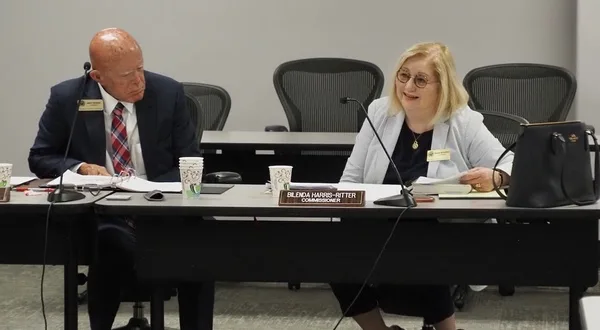
Requested by Commissioner William Luther, and approved by all other present members except Jonathan Williams, the section of the report reads: “The result of the audit shows that counties utilizing voting equipment had confirmed 100% accurate results. The county that chose to utilize a hand-count process did not achieve 100% results and identified ballots that it failed to count.”
The information is expected to be included in a future press release issued by the State Board of Election Commissioners. The release date was not stated.
Williams, who phoned into the commissioners’ meeting, said he thought including the information in a press release would be “making a statement without making a statement.”
“If we publish that, and play it logically forward, we’re going to ask that – we would be inferring we want everybody to do electronic,” Williams said. “Is that what we’re saying?”
Commissioner Bilenda Harris-Ritter responded, “No, we’re just simply saying what works. …We’re making a statement about what the results were from our audit.”
When Williams questioned what the motive behind making the statement was, Harris-Ritter said, “It’s just a statement about our audit.”
The audit found several discrepancies in Searcy County, a rural North Central Arkansas county that hand counted ballots, including a calculation error in the vote tallies and several ballots that were properly cast but not counted. In total, 11 ballots should have been counted but were not.
The results of Searcy County’s hand-counted ballots were discussed at a legislative Joint Performance Review Committee in June. During the meeting, county election commission Chairwoman Laura Gross admitted to lawmakers that the hand counting process was imperfect and had a learning curve.
Gross expressed concerns that voting machines could be manipulated. Election officials assured her, and have said many times before and since, that the machines are impossible to hack.
Searcy County has a population of nearly 8,000 people. Gross said fewer than 10 voters chose to use voting machines in November when presented with the option of using paper ballots instead.
Approximately 1,700 votes were cast in the county in the March primary election. Approximately 30 people helped count ballots, which took the entire day following the election.
Paper ballot lawsuits
Arkansas voters typically cast their ballots on a machine, which then prints out a receipt documenting the vote. If the ballot is void of errors, it goes into a tabulator where it is counted. The tabulator contains a special flash drive that the secretary of state’s office receives after the election noting the results.
But some residents, including those represented in recent lawsuits regarding paper ballot petitions, prefer hand-counting ballots and consider it more secure.
Nine lawsuits have been filed this month over failed ballot-counting petitions. A judge this week ruled that the county clerks in Cleburne and Independence counties must certify petitions to put a proposed paper-ballot ordinance before voters in November.
The county clerks have 30 days to appeal the decision to the Arkansas Supreme Court.
Rulings have yet to be filed for the “Hand-Marked, Hand-Counted Paper Ballot Ordinance of 2024” petitions in Conway, Van Buren, Sharp, Saline, White, Perry and Johnson counties.
In 2023, Sen. Ken Hammer, R-Benton, passed a law that required counties to bear the financial burden of hand counting ballots. The Searcy County primary election cost the county more than $3,000. Officials in more populated counties said the price tag could be higher, and the process could require multiple days of counting.
Other business
A lawsuit challenging a rule requiring Arkansas voters to put pen to paper on their voter registration forms will go before a federal judge Thursday in Washington County.
The voter advocacy group Get Loud Arkansas, joined by Vote.org and two Arkansas voters, in June filed suit in the U.S. District Court for the Western District of Arkansas against Secretary of State John Thurston, the Arkansas State Board of Election Commissioners and the county clerks of Benton, Pulaski and Washington counties.
Lawmakers gave final approval of the rule barring electronic signatures except when completed at certain state agencies last week. They also approved up to $500,000 for the State Board of Election Commissioners to hire outside legal counsel to defend itself in the suit.
The agency would typically be represented by the attorney general’s office, but they have recused their services because of a previous opinion that conflicts with the case.
To view this story, or more news updates from Arkansas Advocate, click here.
WebReadyTM Powered by WireReady® NSI










